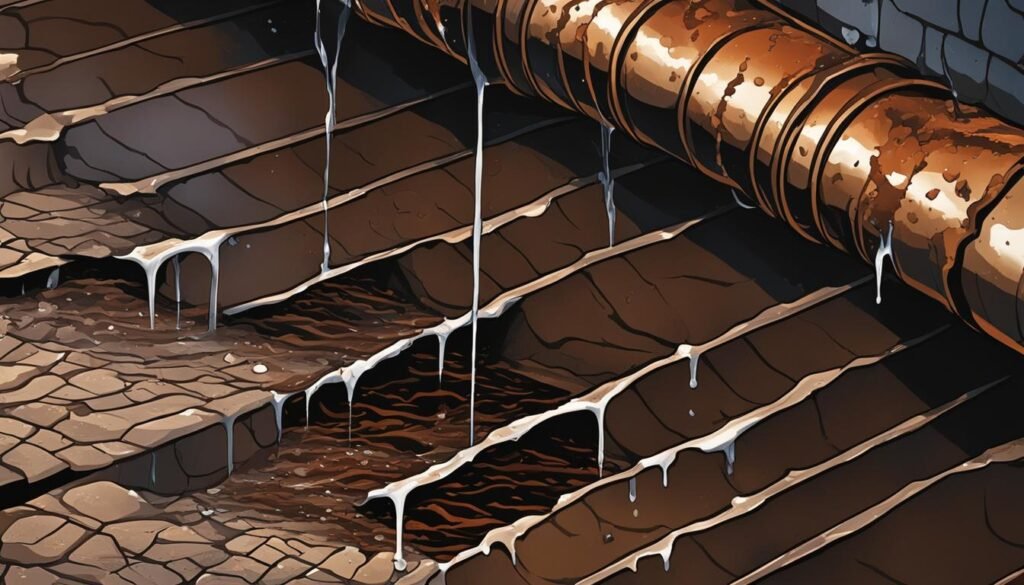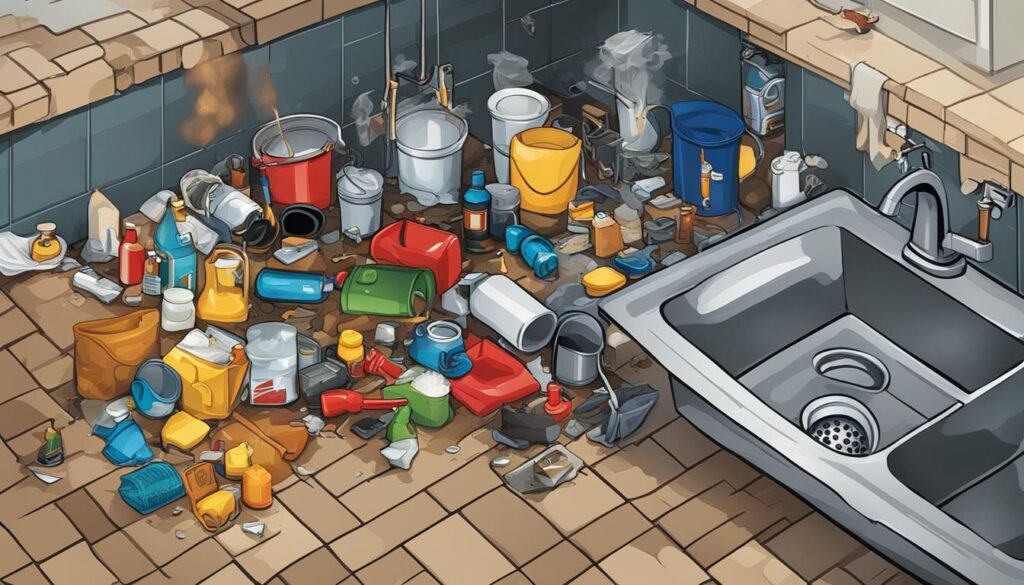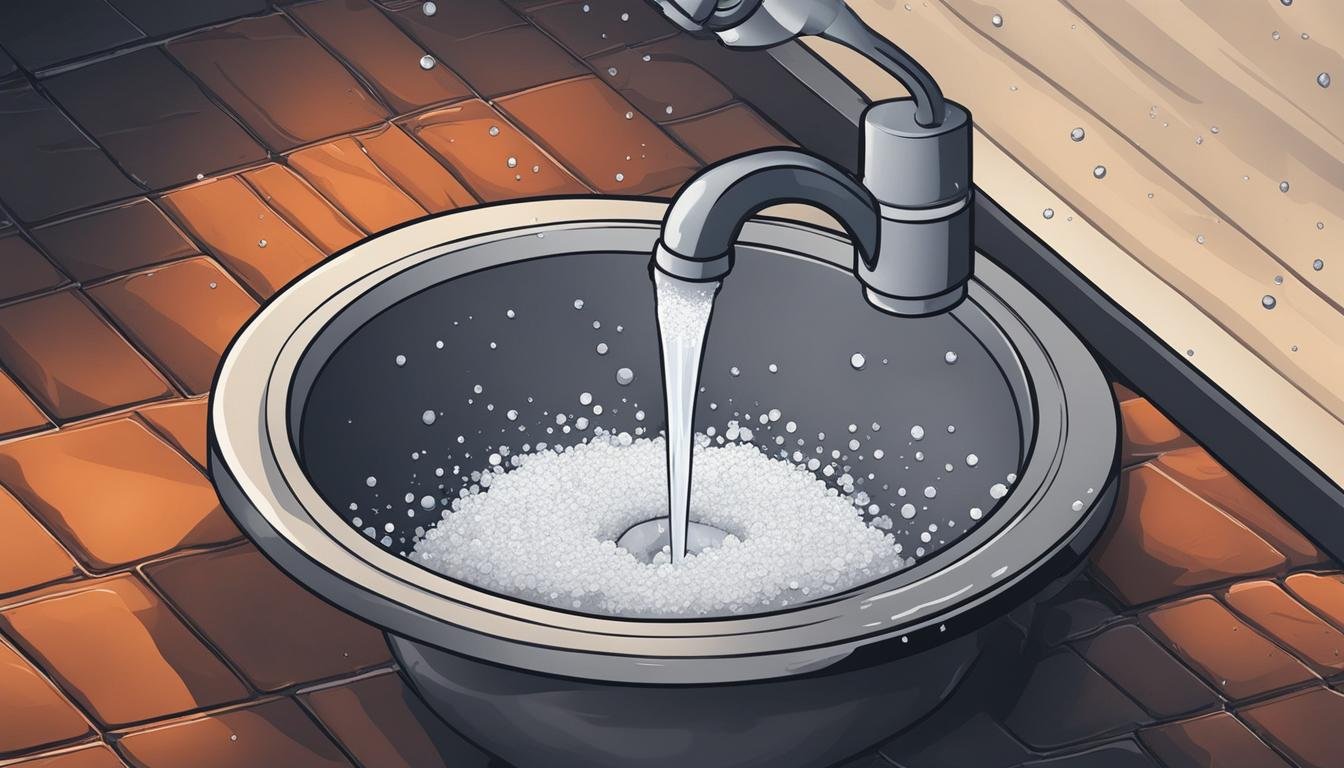Pouring salt down the drain has long been considered a remedy for clogged pipes. But does it actually work? In this article, we will delve into the common myths surrounding salt as a drain cleaner and uncover the real benefits it may offer.
Contrary to popular belief, pouring salt alone down the drain does not effectively unclog the pipes. The idea behind this myth is that the coarse texture of salt can break up the clog, but there is no scientific evidence to support this claim. However, salt can be used as an ingredient in homemade drain cleaners, when combined with other components such as baking soda. These mixtures may help to clear minor clogs and eliminate odors in the drain. But for more serious clogs, it is always best to seek the services of a professional plumber.
Key Takeaways:
- Pouring salt alone down the drain does not effectively unclog pipes.
- Salt can be used as an ingredient in homemade drain cleaners when combined with baking soda.
- Mixtures of salt and other components may help clear minor clogs and eliminate odors.
- For more serious clogs, it is recommended to consult a professional plumber.
- Professional drain cleaning services are the most reliable solution for clearing clogs and maintaining a healthy plumbing system.
Common Household Items to Avoid Pouring Down the Drain
When it comes to maintaining a healthy plumbing system, it’s important to know what items should never be poured down the drain. Pouring these common household items down the drain can lead to clogs, blockages, and costly plumbing repairs. Here are some items that you should avoid pouring down your drain:
- Grease: Pouring grease down the drain can cause it to solidify and create stubborn clogs. Instead, allow grease to cool and dispose of it in the trash.
- Expanding foods: Items like rice and pasta can expand when exposed to water, leading to blockages in your pipes. Dispose of these items in the trash or compost.
- Coffee grounds: Coffee grounds do not break down easily and can accumulate in your pipes, causing clogs. Dispose of them in the trash or use them in your garden as compost.
- Flour: Flour can form a paste-like substance when mixed with water, which can create blockages in your pipes. Dispose of excess flour in the trash.
- Eggshells: Eggshells can cause damage to your garbage disposal and pipes, as they can get stuck and create blockages. Dispose of eggshells in the trash or use them as compost.
- Fibrous fruits and vegetables: Fibrous foods like celery, banana peels, and corn husks can wrap around the blades of your garbage disposal and cause clogs. Dispose of them in the trash or compost.
- Paint: Pouring paint down the drain can contaminate the water supply and lead to environmental damage. Dispose of paint properly according to local regulations.
- Paper products: Items like paper towels, tissues, and sanitary products can easily clog your pipes. Dispose of them in the trash.
- Harsh cleaning products: Chemical cleaners can corrode your pipes and cause damage. Follow the instructions on the label for proper disposal.
- Flushable products: Many so-called “flushable” products like wipes and feminine hygiene products do not break down easily and can cause blockages. Dispose of them in the trash.
- Medication: Flushing medication down the drain can contaminate the water supply. Check with your local pharmacy or medical facility for proper medication disposal options.
By avoiding these items in your drains, you can help prevent clogs, protect your plumbing system, and save yourself from expensive repairs down the line. It’s important to dispose of these items properly and follow the recommended disposal methods to maintain a healthy plumbing system and protect the environment.
The Truth About Pouring Salt Down the Drain
While pouring salt alone down the drain is not effective for unclogging drains, combining salt with other ingredients can have some benefits. One popular homemade remedy involves mixing salt with baking soda and pouring it down the drain. This mixture may help to clear minor clogs and eliminate odors.
However, it is important to note that the effectiveness of these homemade cleaners can vary depending on the severity of the clog. For more serious clogs, it is best to consult a professional plumber or consider using professional-grade drain cleaning products.
Using salt and baking soda is a common and eco-friendly alternative to harsh chemical drain cleaners. Salt acts as an abrasive agent, helping to break down small blockages, while baking soda works as a natural deodorizer. When combined with vinegar or hot water, this mixture can create a foaming action that can further help to clear out debris in the pipes.
Overall, while salt can play a role in maintaining a healthy drain system, it is not a miracle solution for severe clogs. Depending on the nature of the clog and the condition of the pipes, professional assistance may be necessary for optimal results.
The Dangers of Pouring Boiling Water Down the Drain with Salt
While using salt as a remedy for clogged drains can have some benefits, it is important to exercise caution when it comes to pouring boiling water down the drain. Boiling water can pose risks to the integrity of PVC pipes, especially in curved sinks. The heat from boiling water can cause the PVC pipes to warp or even split, leading to leaks and potential damage to your plumbing system.
It’s crucial to remember that PVC pipes are not designed to withstand the extreme temperatures of boiling water. Pouring boiling water down the drain can result in costly repairs and inconvenience. It’s always better to take a safer approach to drain cleaning to ensure the longevity of your plumbing system.
When dealing with clogged drains, it is recommended to use alternative methods such as homemade drain cleaners or professional-grade products. These methods can effectively clear minor clogs without exposing your pipes to the dangers of boiling water. By choosing safer alternatives, you can prevent potential damage and maintain the functionality of your plumbing system.

The Dangers of Curved Sinks
In addition to the risks associated with pouring boiling water down the drain, curved sinks can further complicate matters. The design of curved sinks can make it more challenging for water and other substances to flow freely through the drain pipes.
When boiling water is poured into a curved sink, it accelerates the temperature rise in the PVC pipes, making them more susceptible to damage. The curved shape of the sink can restrict the expansion of the PVC pipes, leading to potential cracks or even a split sink in the case of porcelain materials.
If you have a curved sink, it is essential to exercise caution when attempting DIY drain cleaning methods. Consulting a professional plumber or using alternative drain cleaning options is the best course of action to avoid damaging your sink and plumbing system.
The Best Solution for Clogged Drains
When faced with a clogged drain, it can be tempting to turn to DIY remedies or store-bought drain cleaners. However, the most reliable and effective solution is to call a professional plumber for drain cleaning.
Professional plumbers have the expertise and specialized tools to tackle even the toughest clogs. They can use methods like snaking or hydro jetting to thoroughly clean the pipes and restore proper drainage. By relying on professional drain cleaning services, homeowners can save time and avoid the frustration of dealing with recurring clogs.
“Calling a professional plumber for drain cleaning ensures that the job is done right the first time. They have the knowledge to identify the root cause of the clog and provide a targeted solution,” says John Smith, a licensed plumber with 20 years of experience.
In addition to clearing clogs, professional drain cleaning services offer several benefits. They can help prevent future plumbing issues by identifying potential problems and addressing them before they become major repairs. Routine drain cleaning can also improve the overall health and longevity of the plumbing system, saving homeowners money in the long run.
Investing in professional drain cleaning services is the smartest choice for maintaining a healthy plumbing system. Instead of wasting time and money on ineffective DIY methods, homeowners can rely on the expertise of professional plumbers to keep their drains clear and their plumbing system in top shape.
What Can and Can’t Be Poured Down the Drain
When it comes to maintaining a healthy plumbing system, it’s important to know what substances can and can’t be poured down the drain. Proper disposal methods not only prevent clogs and damage to pipes but also help protect the environment. Here’s a breakdown of safe and harmful substances for drains:
Safe Substances for Drains:
- Vinegar: Vinegar is a natural cleaner that can help eliminate odors in drains. It can be safely poured down the drain to freshen up the pipes.
- Baking Soda: Baking soda is another natural cleaner that can be used to keep drains clean. When combined with vinegar, it creates a foaming reaction that can help clear minor clogs.
- Soap and Water: Ordinary soap and water can be safely poured down the drain. They help keep the pipes clean and free from residue.
Harmful Substances for Drains:
- Grease: Grease should never be poured down the drain as it solidifies and clogs the pipes over time. It’s best to collect and dispose of grease in a separate container.
- Paint: Paint contains chemicals that are harmful to the environment and can damage pipes. It should be properly disposed of according to local regulations.
- Harsh Cleaning Products: Strong chemical cleaners can corrode pipes and cause long-term damage. It’s best to avoid pouring them down the drain and opt for safer alternatives.
- Medication: Medication should never be flushed down the drain or toilet as it can contaminate water supplies and harm aquatic life. Instead, check with local pharmacies for proper disposal methods.
By following these guidelines and using safe substances for drains, you can help maintain a healthy plumbing system and contribute to a cleaner environment.

Debunking Common Myths About Salt and Drain Cleaning
When it comes to salt and drain cleaning, there are numerous myths floating around. Let’s separate fact from fiction and debunk some of the common misconceptions surrounding salt as a pipe cleaner. One popular myth is that pouring salt alone down the drain can effectively clear clogs. However, there is no scientific evidence to support this claim. Salt’s coarse texture may not be strong enough to break up stubborn clogs and restore proper drainage.
Another myth involves using vinegar and salt together as a homemade drain cleaner. While vinegar can help eliminate odors, the effectiveness of this mixture in clearing clogs is questionable. There is no scientific basis to support the claim that vinegar and salt can effectively unclog drains.
“Salt alone is not an effective method for unclogging drains. When it comes to serious clogs, it is best to consult a professional plumber or consider using professional-grade drain cleaning products.”
While salt can be used as an ingredient in homemade drain cleaners, its effectiveness may vary depending on the severity of the clog. For severe clogs, it is always recommended to seek the expertise of a professional plumber. They have the tools, knowledge, and experience to efficiently clear clogs and ensure optimal drainage.
Summary:
- Pouring salt alone down the drain does not effectively clear clogs.
- Vinegar and salt may not be a reliable homemade drain cleaner.
- Consulting a professional plumber is the best solution for severe clogs.
Conclusion
In conclusion, while pouring salt down the drain alone is not an effective method for unclogging drains, it can still be a useful ingredient in homemade drain cleaners. When combined with other components like baking soda, salt may help clear minor clogs and eliminate odors. However, for more serious clogs, it is always best to seek the expertise of a professional plumber.
Professional drain cleaning services provide the most reliable solution for clearing clogs and ensuring a healthy plumbing system. Plumbers have the knowledge and tools to effectively remove even the toughest clogs, using methods like snaking or hydro jetting. By investing in professional services, homeowners can prevent costly repairs and maintain proper drainage in their homes.
So, while salt may have some benefits when it comes to drain cleaning, it is important to remember that it is not a miracle solution. For severe clogs and long-term maintenance, it is recommended to rely on professional drain cleaning services and avoid potentially damaging DIY methods. Taking care of your drains and seeking professional help when needed will ensure a smoothly flowing plumbing system for years to come.
FAQ
Does pouring salt down the drain unclog drains?
No, pouring salt alone does not effectively unclog drains.
What household items should I avoid pouring down the drain?
Grease, expanding foods like rice and pasta, coffee grounds, flour, eggshells, fibrous fruits and vegetables, paint, paper products, harsh cleaning products, flushable products, and medication should not be poured down the drain.
Can salt be used as a homemade drain cleaner?
Yes, when combined with other ingredients like baking soda, salt can be used as a homemade drain cleaner for minor clogs and odors.
Can boiling water be poured down the drain with salt?
It is not recommended to pour boiling water down the drain with salt as it can cause damage to PVC pipes and curved sinks.
What is the best solution for clogged drains?
Calling a professional plumber is the best solution for clogged drains as they have the expertise and tools to effectively clear clogs and prevent future plumbing issues.
What can and can’t be poured down the drain?
Safe substances for drains include vinegar, baking soda, soap, and water. Harmful substances that should not be poured down the drain include grease, paint, paper products, harsh cleaning products, and medication.
Are there any myths about salt and drain cleaning?
Yes, there are myths about salt and drain cleaning, such as the belief that salt alone can effectively clear clogs and that vinegar and salt can be used together as a drain cleaner.

